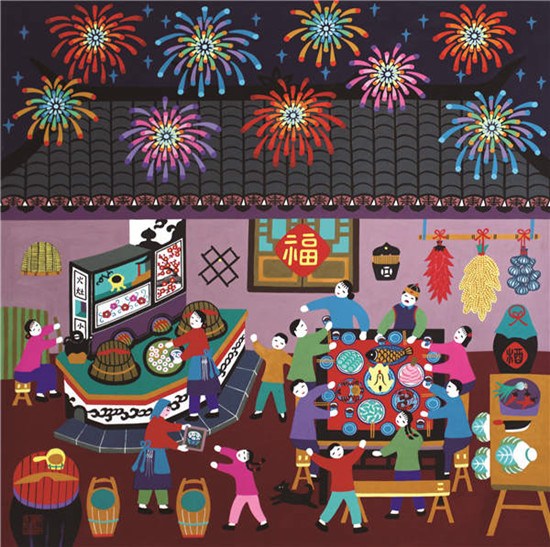
Qiu Jianguo/For China Daily
Of all the meals Chinese people have during the year, there is none more significant than the reunion dinner on the eve of the Lunar New Year
Weeks ahead of the Spring Festival every year, millions of Chinese migrant workers around China embark on the trip back to their home towns in order to partake in the family reunion dinner. The fact that they do so, regardless of how long and arduous the journey may be, says much about the significance of the occasion.
The tradition of sitting around a table to share a meal on the eve of the Lunar New Year, which falls on Feb 8 this year, is something that has been around for hundreds of years, and it encapsulates the Chinese people's value of family bonds.
"The reunion dinner is so important because it signifies the unity and prosperity of the family-every generation, from the great-grand parents to newborns, come together for this event. There is hardly another day in the year when you will find everybody in the family around you," says Qiao Xiaomei, a 66-year-old Shanghai native.
Because large extended families have been split into smaller nuclear units these days, the dinner event has taken on an even great-er significance of family reunion."We used to look forward more to the nice food but now it's all about bringing the clan together. It is so hard to be able to get three or four generations together under one roof. This is perhaps the only opportunity in the whole year," says Wang Yongyong, a 57-year-old Shanghai native.
Preparation for the big feast begins about a month before the eve of the Chinese New Year. This is the period when markets are swarmed with people fighting to stock up on enough vegetable and poultry before the vendors return to their home provinces to spend the New Year.
When most of the ingredients are ready, housewives will list the dishes they need to cook as there is often a comprehensive selection. They include appetizers, hot dishes, soups, rice dumplings and wontons. Qiao says that the total number of dishes must be of an even number as this symbolizes good luck.
The dishes cooked vary between local cultures. For Wang Manhua, a 65-year-old Shanxi native who has lived in Shanghai for more than 20 years, the jiaozi, or dumpling, is an indispensable item on her reunion dinner menu as it is a staple for people in Northern China.


















































